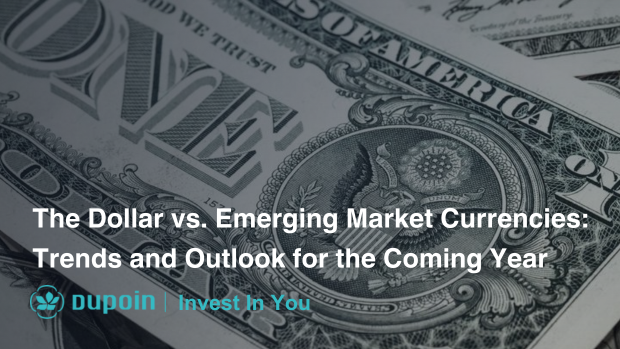

The Dollar vs. Emerging Market Currencies: Trends and Outlook for the Coming Year

The U.S. dollar has long been a dominant force in the global financial system, acting as the world’s reserve currency and a benchmark for international trade. However, its interaction with emerging market (EM) currencies remains a key focus for many global investors, given the significant impact this relationship has on global markets and investment strategies. This article explores the trends shaping the dollar’s connection with EM currencies and offers an outlook for the year ahead.
The Dollar’s Dominance and EM Vulnerabilities
Emerging market currencies are often subject to significant volatility due to their economies' dependence on external factors like commodity prices, foreign investment, and geopolitical stability. The dollar's fluctuations are central to this dynamic.
When the dollar strengthens, borrowing costs for EM nations usually rise. Many emerging markets are heavily reliant on dollar-denominated debt, so a stronger dollar can increase the cost of repaying this debt, straining national budgets. Conversely, a weaker dollar tends to offer relief to these economies, as local currencies appreciate, reducing the burden of external debt and encouraging foreign investment.
In recent years, the dollar has fluctuated in response to factors such as U.S. monetary policy, global risk sentiment, and geopolitical events. These changes have created both opportunities and challenges for emerging markets.
Key Trends Shaping the Dollar-EM Relationship
- U.S. Federal Reserve Policy
The monetary policy of the Federal Reserve plays a key role in driving the strength of the dollar. When the Fed tightens policy by raising interest rates or reducing its balance sheet, the dollar tends to appreciate. This often leads to capital outflows from EM economies as investors seek higher returns in the U.S., which weakens local currencies.
If U.S. inflation moderates and the Fed shifts toward easing, the dollar could weaken, benefiting EM currencies. However, if inflation remains persistent or U.S. economic growth accelerates, the dollar could maintain or even increase its strength.
- Commodity Prices and Trade Balances
Emerging markets are heavily reliant on commodity exports, and the strength of the dollar can impact these markets. A stronger dollar can reduce global demand for commodities, as they are often priced in dollars, thus lowering export revenues for EM nations. However, a global economic recovery and higher demand for commodities can strengthen EM currencies despite a stronger dollar.
For example, oil-exporting countries like Brazil and Mexico often see their currencies move in sync with oil prices. Similarly, nations that export metals like South Africa benefit from rising global demand for minerals such as gold and platinum.
- Geopolitical Risks and Global Sentiment
Geopolitical stability is a crucial factor affecting investor confidence in EM currencies. Political unrest, sanctions, or international conflict can lead to sharp currency depreciation. In contrast, improving geopolitical conditions can enhance foreign investment and strengthen local currencies.
The dollar’s status as a safe-haven asset tends to exacerbate these trends. During periods of global uncertainty, investors flock to the dollar, causing emerging market currencies to weaken. As geopolitical conditions stabilize, EM currencies may experience a rebound.
Outlook for the Year Ahead
Looking ahead, the outlook for the U.S. dollar and emerging market currencies is mixed, with several competing factors at play:
- Potential Dollar Weakness
If the U.S. Federal Reserve shifts toward rate cuts in response to moderating inflation and slower economic growth, the dollar could weaken. In such a scenario, emerging market currencies may benefit from capital inflows as investors seek higher returns in EM assets.
- Resilience in Key Emerging Markets
Certain emerging economies, such as India and Indonesia, have shown resilience through strong domestic demand and sound macroeconomic policies. These countries are well-positioned to attract investment even if the global economic environment remains uncertain.
- China’s Role
China's economic policies and recovery will have a significant impact on EM currencies. As one of the largest trading partners for many emerging markets, a robust Chinese economy could boost demand for commodities, thereby improving trade balances for EM nations and supporting their currencies.
- Geopolitical Stability
If geopolitical tensions in regions like Europe and the Middle East subside, the dollar's appeal as a safe haven may diminish. This would allow EM currencies to strengthen, provided that domestic conditions remain favorable in these countries.
- Investment Implications
The relationship between the dollar and emerging market currencies presents both risks and opportunities for investors. A weakening dollar could lead to stronger returns on EM assets, making them attractive additions to a diversified investment portfolio. However, the volatility of currencies and geopolitical risks necessitate careful analysis and risk management strategies.
Investors will need to pay attention to developments in global economic conditions, including the pace of recovery in developed markets, as these factors could indirectly affect emerging market currencies. Hedging currency risks, focusing on nations with stable fiscal policies, and keeping an eye on central bank policies will be critical for success in the coming year.
Conclusion
The relationship between the U.S. dollar and emerging market currencies remains dynamic and complex. While U.S. monetary policy, commodity prices, and geopolitical factors will continue to shape this relationship, the outlook for EM currencies is cautiously optimistic. By understanding these trends, investors and policymakers can better navigate the challenges and seize opportunities in the evolving global financial landscape.
Disclaimer
Derivative investments involve significant risks that may result in the loss of your invested capital. You are advised to carefully read and study the legality of the company, products, and trading rules before deciding to invest your money. Be responsible and accountable in your trading.
RISK WARNING IN TRADING
Transactions via margin involve leverage mechanisms, have high risks, and may not be suitable for all investors. THERE IS NO GUARANTEE OF PROFIT on your investment, so be cautious of those who promise profits in trading. It's recommended not to use funds if you're not ready to incur losses. Before deciding to trade, make sure you understand the risks involved and also consider your experience.
